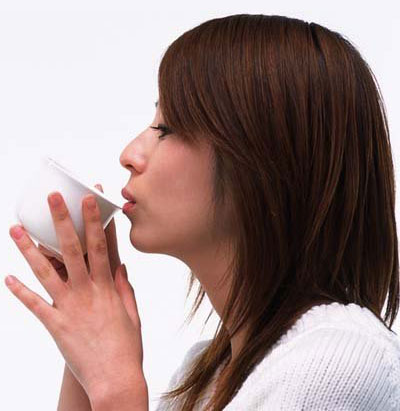According to a new study published on bmj.com website, we are advised to only drink tea after it has been brewed for a few minutes. Research indicates that if drinking tea of hot (from 70 degrees C or more) may increase the risk of esophageal cancer - the tube leads food from the throat to the stomach.
The study was conducted in northern Iran where a large amount of green tea is consumed every day.
But an editor said that these findings are not a cause to warn people. The most common advice is to wait for food and drinks to cool slightly before swallowing.
Esophageal cancer has killed more than 500,000 people worldwide every year , and the type of esophageal squamous cell carcinoma (OSCC) is the most common form. In Europe and the United States, the main cause is smoking and drinking, which is more common in men. But drinking hot drinks is also a risk factor.
Golestan city in northern Iran is one of the highest rates of OSCC in the world, but the rate of smokers and drinkers is low. Here women are more often diagnosed with diseases than men. However, drinking tea is a common habit. So the scientists shook hands and conducted a test of the relationship between tea drinking habits and OSCC risk.
They studied tea drinking habits in 300 people diagnosed with OSCC and combined with the results of 571 healthy people in the same area. Almost all participants drink black tea regularly, the average volume they drink each day is over 1 liter.
Compared to drinking warm tea (65 degrees C or less), drinking hot tea (65-69 degrees C) is associated with double the risk of esophageal cancer and hot tea (from 70 degrees C). back up with an 8-fold increase in risk.
 Drinking tea too hot increases the risk of throat cancer (Photo: .okinawaprogram.com)
Drinking tea too hot increases the risk of throat cancer (Photo: .okinawaprogram.com)
Similarly, compared to drinking tea within 4 minutes or more after pouring it out, drinking tea after pouring it for less than 2 minutes increases the risk by 4 or 5 times. There is no relationship between intake of tea and risk of cancer.
In order to minimize errors in the actual tea temperature and tea temperature that participants reported, the researchers had to determine the actual temperature when 50,000 participants took tea . The temperature is in the range of less than 60 degrees Celsius to over 70 degrees C. There is a relative homogeneity between the measured actual temperature and the temperature mentioned by participants.
The authors report that their findings show a strong association between the risk of esophageal squamous cell carcinoma and the habit of drinking hot or hot tea.
Previous studies conducted in the United Kingdom also gave an average of 56 to 60 degrees Celsius in healthy groups.
They also said that informing people about the risk of hot tea drinking habits could be very helpful in reducing the effects of esophageal cancer in Golestan as well as other high-risk groups sharing the same habit.
According to David Whiteman of the Queensland Institute of Medical Research in Australia, the results provide compelling evidence that drinking hot tea at temperatures higher than 70 degrees Celsius may increase the risk of esophageal squamous cell carcinoma.
The study also supports the notion that heat damage may be the cause of epithelial cancer although the mechanism of temperature promoting tumor growth has not been clarified and requires additional research.
However, the author stressed that these findings are not a cause for warning, nor are they grounds to force people to reduce their interest in elegant tea drinking habits. Instead, we should wait at least 4 minutes or more for tea and drinks to cool down from the level that can cause burns to the point of being able to drink.
 Green tea cleans teeth better than mouthwash?
Green tea cleans teeth better than mouthwash? Death kiss: This is why you should not let anyone kiss your baby's lips
Death kiss: This is why you should not let anyone kiss your baby's lips What is salmonellosis?
What is salmonellosis? Caution should be exercised when using aloe vera through eating and drinking
Caution should be exercised when using aloe vera through eating and drinking Unique and rare plant species in Vietnam: Rarely found anywhere, high risk of extinction!
Unique and rare plant species in Vietnam: Rarely found anywhere, high risk of extinction!  Unique thousand-year-old tree species in Vietnam: Only 60 trees left, finished product price 680 million VND/kg!
Unique thousand-year-old tree species in Vietnam: Only 60 trees left, finished product price 680 million VND/kg!  Duy Tan University students make tea from corn guts
Duy Tan University students make tea from corn guts  A unique type of plant that increases in price 13 times when bitten by bugs. Only a few provinces in Vietnam can grow it.
A unique type of plant that increases in price 13 times when bitten by bugs. Only a few provinces in Vietnam can grow it.  This type of water requires only 1 spice to effectively lower blood sugar, help sleep well, nourish the brain and also support weight loss
This type of water requires only 1 spice to effectively lower blood sugar, help sleep well, nourish the brain and also support weight loss  This type of water is not coffee but helps wake up immediately: Controls blood sugar and also effectively prevents aging
This type of water is not coffee but helps wake up immediately: Controls blood sugar and also effectively prevents aging 